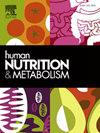Adherence to the mediterranean diet and risk of hypoglycemia in insulin-treated type 2 diabetic patients
IF 1.8
Q3 ENDOCRINOLOGY & METABOLISM
引用次数: 0
Abstract
Background and aims
Lifestyle intervention, aimed at weight loss and increasing physical activity, is widely known as the first-line treatment in diabetes. Adherence to a medical nutritional therapy (MNT) is even more relevant in patients on insulin therapy. However, data on the relationship between diet composition and glycemic control indexes derived from continuous glucose monitoring (CGM) in type 2 diabetes (T2D) are scarce and inconsistent. Our aim was to evaluate the association between adherence do Mediterranean diet (MD) and CGM metrics in a cohort of T2D patients treated with insulin.
Methods and results
We retrospectively collected data of 25 patients with T2D on insulin therapy, at the Diabetes Unit of University Hospital in Siena. They were prescribed a flash glucose monitoring (FGM) system and accepted to answer the MEDLIFE questionnaire, a validated tool designed to explore the adherence to MD. Adherence to MD did not seem to influence glycemic control indexes in our cohort. It is worth mentioning that the risk of hypoglycemia and time spent in hypoglycemia was found to be highly influenced by alcohol consumption, even in minimal amounts (according to national guideline recommendations).
Conclusion
Nutritional counselling for patients with insulin-treated T2DM should include a focus on alcohol consumption – ideally to be avoided - and related hypoglycemic risk.
坚持地中海饮食与胰岛素治疗的2型糖尿病患者低血糖的风险
背景和目的以减肥和增加身体活动为目的的生活方式干预被广泛认为是糖尿病的一线治疗方法。在接受胰岛素治疗的患者中,坚持医学营养治疗(MNT)更为重要。然而,关于2型糖尿病(T2D)患者通过连续血糖监测(CGM)得出的饮食组成与血糖控制指标之间关系的数据很少且不一致。我们的目的是评估一组接受胰岛素治疗的t2dm患者坚持地中海饮食(MD)和CGM指标之间的关系。方法和结果我们回顾性收集了锡耶纳大学医院糖尿病科25例接受胰岛素治疗的t2dm患者的资料。他们使用了一套快速血糖监测(FGM)系统,并接受了MEDLIFE问卷调查,这是一种有效的工具,旨在探讨MD的依从性。在我们的队列中,坚持MD似乎没有影响血糖控制指标。值得一提的是,低血糖的风险和处于低血糖状态的时间被发现受到饮酒的高度影响,即使是少量饮酒(根据国家指南建议)。结论:胰岛素治疗的T2DM患者的营养咨询应包括关注饮酒(最好避免饮酒)和相关的低血糖风险。
本文章由计算机程序翻译,如有差异,请以英文原文为准。
求助全文
约1分钟内获得全文
求助全文
来源期刊

Human Nutrition and Metabolism
Agricultural and Biological Sciences-Food Science
CiteScore
1.50
自引率
0.00%
发文量
30
审稿时长
188 days
 求助内容:
求助内容: 应助结果提醒方式:
应助结果提醒方式:


